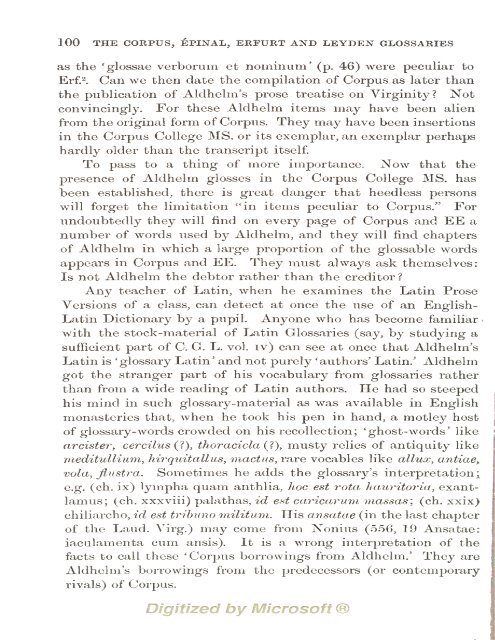the corpus, épinal, erfurt and leyden glossaries, viii - World eBook ...
the corpus, épinal, erfurt and leyden glossaries, viii - World eBook ...
the corpus, épinal, erfurt and leyden glossaries, viii - World eBook ...
Create successful ePaper yourself
Turn your PDF publications into a flip-book with our unique Google optimized e-Paper software.
100 THE COEPUS, EPINAL, ERFURT AND LEYDEN GLOSSARIES ^<br />
as <strong>the</strong> 'glossae verborum et nominum' (p. 46) were peculiar to<br />
Erf.^. Can we <strong>the</strong>n date <strong>the</strong> compilation of Corpus as later than<br />
<strong>the</strong> publication of Aldhelm's prose treatise on Virginity? Not<br />
convincingly. For <strong>the</strong>se Aldhelm items may have been alien<br />
from <strong>the</strong> original form of Corpus. They may have been insertions<br />
in <strong>the</strong> Corpus College MS. or its exemplar, an exemplar perhaps<br />
hardly older than <strong>the</strong> transcript itself.<br />
To pass to a thing of more importance. Now that <strong>the</strong>-<br />
presence of Aldhelm glosses in <strong>the</strong> Corpus College<br />
MS. has<br />
been established, <strong>the</strong>re is great danger that heedless persons<br />
will forget <strong>the</strong> limitation "in items peculiar to Corpus." For<br />
<strong>and</strong> EE a<br />
undoubtedly <strong>the</strong>y will find on every page of Corpus<br />
number of words used by Aldhelm, <strong>and</strong> <strong>the</strong>y will find chapters<br />
of Aldhelm in which a large proportion of <strong>the</strong> glossable words<br />
appears in Corpus <strong>and</strong> EE. They must always ask <strong>the</strong>mselves:<br />
Is not Aldhelm <strong>the</strong> debtor ra<strong>the</strong>r than <strong>the</strong> creditor?<br />
Any teacher of Latin, when he examines <strong>the</strong> Latin Prose<br />
Versions of a class, can detect at once <strong>the</strong> use of an English-<br />
Latin Dictionary by a pupil. Anyone who has become familiar<br />
with <strong>the</strong> stock-material of Latin Glossaries (say, by studying a<br />
sufficient part of C. G. L. vol. iv) can see at once that Aldhelm's<br />
Latin is 'glossary Latin' <strong>and</strong> not purely 'authors' Latin.' Aldhelm<br />
got <strong>the</strong> stranger part of his vocabulary from <strong>glossaries</strong> ra<strong>the</strong>r<br />
than from a wide reading of Latin authors. He had so steeped<br />
his mind in such glossary-material as was available in English<br />
monasteries that, when he took his pen in h<strong>and</strong>, a motley host<br />
of glossary- words crowded on his recollection; 'ghost-words' like<br />
arcister, cerciliis (1), ihoracicla{l), musty relics of antiquity like<br />
meditulliuTn, hirquitallus, mactus, rare vocables like allux, antiae,<br />
vola, flustra. Sometimes he adds <strong>the</strong> glossary's interpretation;<br />
e.g. (ch. ix) lympha quam anthlia, hoc est rota hauritoria, exant-<br />
lamus; (ch. xxx<strong>viii</strong>) palathas, id est caricarum massas; (ch. xxix)<br />
chiliarcho, id est trihuno militum. His ansatae (in <strong>the</strong> last chapter<br />
of <strong>the</strong> Laud. Virg.) may come from Nonius (556, 19 Ansatae:<br />
iaculamenta cum ansis). It is a wrong interpretation of <strong>the</strong><br />
facts to call <strong>the</strong>se 'Corpus borrowings from Aldhelm.' They are<br />
Aldhelm's borrowings from <strong>the</strong> predecessors (or contemporary<br />
rivals) of Corpus.

















